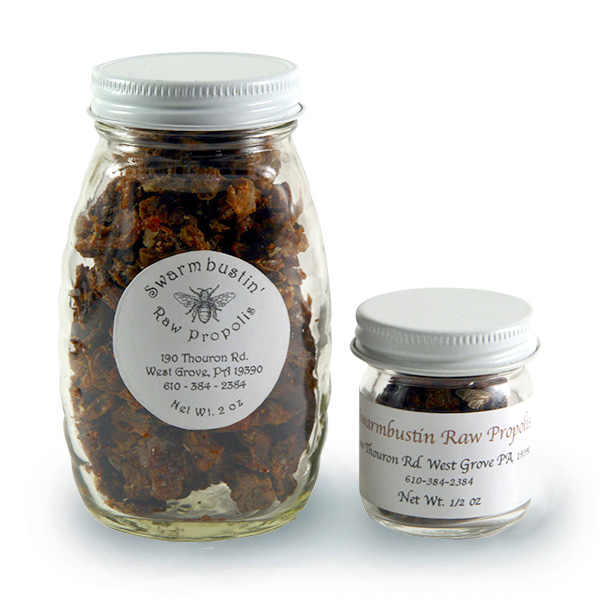
PROPOLIS - Nature's Most Amazing Antibiotic*
The beehive is one of nature’s most remarkable laboratories, converting plant material into a range of extraordinarily complex foods and medicines that maintain the health and vitality of the Honey Bee colony. Dr. Remy Chauvin, an authority on propolis states “The antibacterial and anti-viral properties of propolis work to raise the body’s natural resistance to disease by internally stimulating one’s own immune system. In doing this propolis also supplies added amounts of Vitamin B1, B2 C and E, and all the essential minerals including iron, calcium, manganese, and silicon.” Scientists have found it impossible to come close to the synthetic duplication of the chemical makeup.*
What is Propolis?
Propolis is a sticky resinous wax-like substance consisting of tree sap from many species of tree (especially the poplar) treated to a bee process including the addition of enzymes from the bees’ glandular system. The sap is collected by the worker bees and carried to the hive in the bee’s pollen baskets. Propolis is a Greek word meaning literally “before the city.” This product of the hive is occasionally used to restrict the entrance of the hive, strengthen the attachment of the wax comb, and cocoon any intruders too large for the bees to remove.
In one recorded experiment a virus was introduced into the living embryo in eggs. After propolis was introduced, the virus was destroyed, but the life of the embryo was unharmed, showing that propolis is non-toxic. It is believed the Egyptians were some of the first to use propolis medicinally, finding it effective for their mummification process. Early accounts of propolis recommend its use for problems related to the respiratory system, joints, infections, and skin diseases. Eastern Europe has continued to use propolis and conduct scientific validation since the 1930’s.
*These statements have not been evaluated by the Food and Drug Administration. This product is not intended to diagnose, treat, cure, or prevent any disease.

What are the HEALTH BENEFITS to eating Propolis?*
The properties of propolis have, over its known existence, shown amazing antibiotic, anti-inflammatory, antifungal, anti-viral, antiseptic, and antioxidant attributes. The effectiveness of the substance is due largely to the fact that it doesn’t attack specific bacteria, fungi, or viruses but triggers the bodies’ own protective devices into action. Among the many other benefits of propolis is that some of the components function as antioxidant free-radical scavengers in the body. Propolis contains a local anesthetic that numbs mucus membranes and has a high concentration of bioflavonoids. Bioflavonoids enhance the effectiveness of Vitamin C, stimulate enzyme formation, which strengthens the walls of blood vessels, and aids in the body’s production of the natural immune factor.
Any beekeepers would bee able to tell you that Honey Bees are highly susceptible to bacteria and viral infections. Significant medical journals have revealed the many surprising levels of prevention propolis can offer for a variety of ailments. The British use propolis to treat stomach ulcers, and Israeli physicians have been experimenting with its use in treatment of ear, nose, and throat inflammations, as well as viral infections, successfully. The substance works against germs by preventing bacterial cell division and breaking down bacteria walls and cytoplasm, which is exactly how some prescription antibiotics work. It is a great virtue that science is now recognizing these benefits from using such naturally occurring remedies.
Bee Propolis Suggested Uses & Recipes:
The caffeic acids in honey and propolis have shown to be specifically effective against colon cancer. The general complex has fought off staphylococcus aureus, which is a bacterium causing surgical infections, blood poisoning, and a type of pneumonia.
Several medical reports discuss the anti-inflammatory properties, citing effective trials against upper respiratory infections caused by common inflictions such as the common cold and influenza. Other more recent tests have found propolis to be an effective remedy against the fungus Candida Albicans
Tincture Directions: Take your propolis and remove any obvious contaminants. Cut propolis into small pieces and place it in large clean jar. Pour in alcohol (food grade 70 % or higher proof alcohol) and close with tight-fitting lid. Leave the bottle in warm, dark place to soak for one 7–12 days, shaking every day. Filter resulting liquid through fine Muslin cloth or paper coffee filters. Following first filtration place the filtered product in the fridge for a day and then filter again, using as fine filter as possible. Store the liquid in clean dark-colored bottles if possible and store away from direct sunlight. Propolis tincture made in this way will last forever.
How do I EAT PROPOLIS?
Propolis differs from all other antibiotics in every way. It can be taken on an everyday basis as a preventative or maintenance health care program. There are no known side effects or adverse reactions associated with propolis, the body cannot build up immunity against it, and it does not endanger the body’s good bacteria. While antibiotics do not work against viruses, propolis does.
Propolis Composition:
Propolis is a storehouse of nutrients; 55% being resins and balms, 30% wax, 10% etheric (essential) oils, and 5% bee pollen (Bee Pollen is rich in vitamins, minerals, amino acids, and other nutrients and is known to have extensive bacteria destroying benefits).
Propolis is rich in fats, amino acids, organic acids, composite ethers or univalent alcohols, and trace elements such as iron, copper, manganese, zinc and others, tannic acid, phytoncides, and antibiotics. It also has a high vitamin content, especially that of the B group, also E, C, H, P and provitamin. A deeper analysis shows such strange-sounding ingredients as cinnamic acid, cinnamyl alcohol, vanillin, chrysin, galangin, acacetin, paempferid, rhammocitrin, pinostrobin, caffeic acid, tetochrysin, isalpinin, pinocembrin, and ferulic acid.
*These statements have not been evaluated by the Food and Drug Administration. This product is not intended to diagnose, treat, cure, or prevent any disease.
